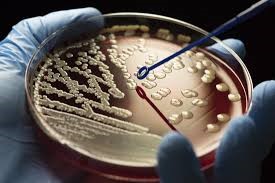Novel bis-amidine compound with antimicrobial activity

Tech ID
19-018
Inventors
E. Brown
M. Farha
C. MacNair
J. Cote
K. Lee
D. Hung
M. Serrano-Wu
B. Hubbard
Patent Status
PCT application filed
Stage of Research
Proof of concept available
Contact
Leigh Wilson
Associate Director, New Ventures
Abstract
More than 2.8 million antibiotic-resistant infections occur in the US in a year, and more than 35,000 people die. Current antibiotics are proving ineffective as bacteria have developed a myriad of resistance mechanisms. Creating antibiotic adjuvants helps potentiate existing antibiotics and regain the upper hand on bacterial infections. It has previously been found that the anti-fungal drug pentamidine acts as a potentiator of Gram-positive antibiotics against Gram-negative bacteria in vitro and in vivo1. Pentamidine is not, however, an ideal compound due to cytotoxicity, and efforts were required to generate improved analogs.
A team of researchers from McMaster University and the Broad Institute have now developed structurally unique bis-amidine compounds with lower cytotoxicity and improved efficacy. These compounds may be used as potentiators to enhance the activity of antibacterial agents versus previously resistant organisms, particularly pan-resistant Gram-negative bacteria. The researchers tested several pentamidine analogs and have optimized two of the least toxic and effective pentamidine analogs. The compounds have shown in vivo efficacy in a mouse A. baumannii model in combination with novobiocin.
Applications
- Novel antibiotic potentiators that restore Gram-positive antibiotic efficacy against all bacteria, including resistant gram-negative bacteria
Advantages
- Enhances gram-positive antibiotics against gram-negative bacteria
- Potentiators have the flexibility of synergizing with rifampicin, novobiocin, and erythromycin (fractional inhibitory concentration [FIC] index <= 0.5)
- 1/5 of the human equivalent therapeutic dose of pentamidine and 1/20 of novobiocin was used to rescue mice infected with A. baumannii recognizing the potential of dose-sparing combinations in therapy1.
References
- Stokes, J. M., MacNair, C. R., Ilyas, B., French, S., Côté, J. P., Bouwman, C., Farha, M. A., Sieron, A. O., Whitfield, C., Coombes, B. K., & Brown, E. D. (2017). Pentamidine sensitizes Gram-negative pathogens to antibiotics and overcomes acquired colistin resistance. Nature microbiology, 2, 17028. https://doi.org/10.1038/nmicrobiol.2017.28


